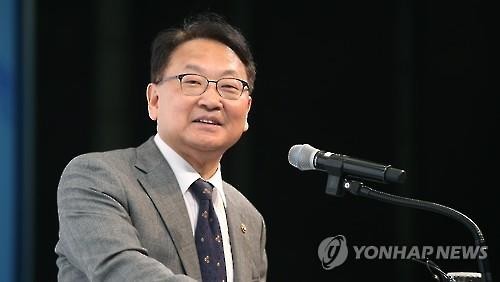Korea’s Finance Minister Yoo Il-ho said that the government will aggressively push forward with restructuring financially vulnerable companies, making this its top priority with the general election over.
The top fiscal policymaker added that it will begin with Korea’s shipping companies that face liquidity crises, saying that he is most concerned with Hyundai Merchant Marine, which is undergoing a self-rescue plan with conditions by its creditors.
 |
Korea’s Finance Minister Yoo Il-ho (Yonhap) |
“I will take this matter (of corporate restructuring) into my own hands,” Yoo told reporters last Friday during a meeting of G20 finance ministers and central bankers in Washington.
“We can no longer hold off restructuring at companies facing overcapacity and financial instability. We need to take action at shipping companies that are not pursuing an overhaul as planned. I am most concerned with Hyundai Merchant Marine.”
As part of its deal with its creditors, Hyundai Merchant Marine needs to negotiate with ship owners to lower charter fees in order to receive liquidity support from banks, otherwise, the shipping company will default on its debt and have to file for bankruptcy.
Creditors urged Hyundai Group’s shipping company to lower its costs in operating and chartering 84 ships borrowed from owners in the United Kingdom and Greece. Hyundai Merchant Marine recently sold its majority stake in Hyundai Securities to KB Financial Group as part of its self-rehabilitation plan.
Hanjin Shipping, part of Korean Air, is also facing a liquidity shortage, recently selling its London office building to refinance its debt. Shares of Korean Air have been volatile due to Hanjin Shipping’s growing credit risks.
Finance Minister Yoo said that he cannot say he is confident that Hyundai Merchant Marine will be able to successfully lower charter fees with foreign ship owners.
Last month, the Financial Services Commission presented a measure to implement debt restructuring of companies that owe more than 3 billion won to banks and failed credit analysis tests. This was the extension of a law enabling creditor-led workouts of conglomerates that owe more than 50 billion won. The regulator excluded tech start-ups or small and medium-size enterprises with less than 3 billion won in loans in its restructuring initiative.
Also, the Financial Supervisory Service recently expanded its list of conglomerates, and included Homeplus, Kumho Petro Chemical and Taeyoung groups on its debt watch list. Corporations that saw their debt increase more than 1.36 trillion won last year were on the list, including Samsung Group, with more than 500 subsidiaries and affiliates, whose outstanding debt increased the fastest among the groups, at around 13 percent, followed by Hyundai Motor Group’s 333 companies at 3 percent.
Finance Minister Yoo also mentioned that Korea currently does not need to finance extra spending that could drive up its debt, but did not rule out the possibility of it in case China’s growth falls to around 5 percent.
By Park Hyong-ki (
hkp@heraldcorp.com)





![[Exclusive] Hyundai Mobis eyes closer ties with BYD](http://res.heraldm.com/phpwas/restmb_idxmake.php?idx=644&simg=/content/image/2024/11/25/20241125050044_0.jpg)
![[Herald Review] 'Gangnam B-Side' combines social realism with masterful suspense, performance](http://res.heraldm.com/phpwas/restmb_idxmake.php?idx=644&simg=/content/image/2024/11/25/20241125050072_0.jpg)

